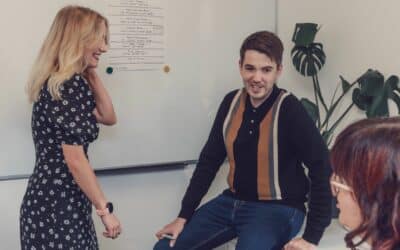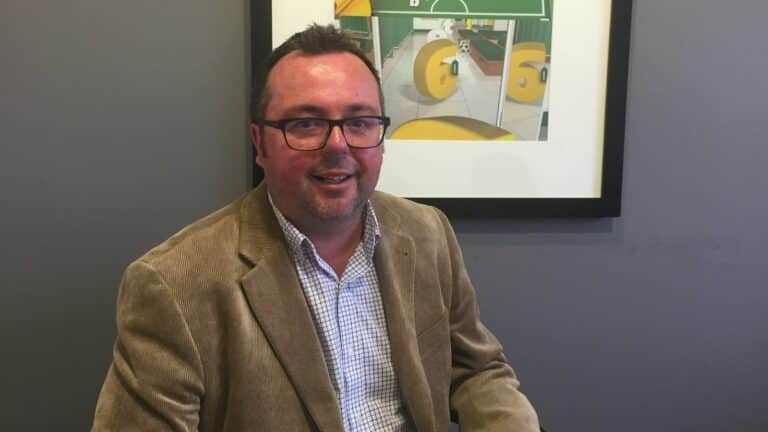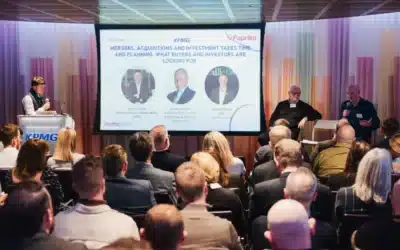As head of sports development for over a decade, Alan Reed has led the teams responsible for innovating the products and services that catapulted bet365 to the front of the global online betting market and kept it there.
Seeing an opportunity to explore new technologies and identify if they can make a meaningful and lasting contribution to the business, he recently took up the reins of a new department. The Platform Innovation Hub is focused on harnessing internal and external innovation and channelling it to drive game-changing breakthroughs in process, product, and platform design.
Here, Reed shares all the lessons he’s learnt across his personal life and career.
Which single daily habit or practice could you not do without?
Thanking people. Done correctly and frequently, it has the ability to change perceptions and break down barriers. Thanks for asking.
What’s been your luckiest break?
Easy. Mid 90’s. Straight out of university. First “real” job interview. I turned up 15 minutes prior to the allotted time, feeling nervous, excited and keen to impress. I was a day early. Two different managers gave up their time and interviewed me. Got the job. Never looked back.
What’s your best failure?
With over half a million concurrent players at peak times, our Bet Builder product is one of our most popular. When we launched it in 2018, it was the first of its kind.
Originally offering users premade bet builds they could edit; we saw an opportunity to add value and create differentiation by putting the customer in complete control of bet selection.
However, with millions of potential bet combinations, the question we had to answer was, how do you achieve the raw power needed to deliver that kind of flexibility, on the fly, to 100,000s of users and make sure the system can calculate the odds in real-time?
Our initial theory was to inject some new software into the existing Bet Builder engine. Why not? It made sense to build on what we already had. It’s what you do in IT. You iterate. But the resulting product created from this approach, failed miserably. We couldn’t get anywhere near the speed or scale we needed.
We had to strip everything back, go back to basics, and start again. What we did have, second time around, was a lot of recently accumulated knowledge. So, we asked the teams to think about what they’d do if they had to rebuild the existing system from scratch.
The result was a product that learned in real-time and could go faster the more you use it. A prediction engine of sorts, that can perform multiple calculations simultaneously.
By starting again, we produced something far better, that’d be future-proofed and could be applied elsewhere in tech development. Iteration is all well and good, but it can create complexity. Sometimes starting with a blank sheet of paper garners far better results.
What is the best investment you’ve ever made, either financial or time?
That’s easy. Mountain biking.
I work in an environment where clarity can be quite difficult to achieve during the working day. Stuff flies at you left, right, and centre, and the aim of the game is to react on your feet. There’s little time to sit back and take stock.
That’s where my investment in mountain biking pays dividends. It’s a wonderful reset. Mountain biking gives me the opportunity to clear my brain’s cache and create room for creativity, new ideas, and reflection.
It’s a simple activity but one where you have to be incredibly focused on one thing. You’re constantly nose down. Sometimes there isn’t a track and sometimes there isn’t a floor. Losing concentration, even for a moment, can see you flying over the handlebars and rolling down a steep incline.
It’s no surprise that broken collar bones are the number one injury mountain bikers sustain. If you went down to Wrexham General on a Saturday afternoon, you’ll find it full of blokes with their arms at funny angles, covered in mud.
It takes precision, practice, and preparation. I find that when you do something that has an element of risk to it, and you control that risk, it helps to put everything else in your life into perspective. It’s also shown me that sometimes, life is just about not falling off. That the best approach is just to hang on in there.
It also taught me to back myself because you can’t do it without confidence in yourself and your ability.
Which podcast or book would you recommend others to read and why?
The Five Disfunctions of a Team by Patrick Lencioni. Nearly all management books are the same. They cover the same ideas and present the same theories. The one you connect with most is the one that’s most relevant to you and is written in a way that hits home. I’ve read a lot of leadership books for my role, and, for me, this was the best.
What I love about it is that it’s written in the form of a story. Rather than an overly complex theoretical text that’s hard to wrap your head around, the story brought all of the principles that I’d been reading for years, to life. It helped me to see beyond the theoretical, to understand people, and what makes them tick.
The three biggest takeaways I took from the book are: That the problems you deal with aren’t always your problems. They’re universal. They happen everywhere. It means you can take the personal out of it. It’s not about you or your team. It’s just something that happens, and here’s how to deal with it.
That human nature is predictable. By understanding what drives human behaviour, I felt empowered. I felt I understood it enough to influence it. Something that had never happened when being presented with theory only.
What you say to people is important, but how you make them feel is more so. To communicate with people effectively, you have to understand them first. You need to know what they believe in and what motivates them.
It’s why asking questions is so important. It makes sure you understand people first, and how best to position what you say, to get the best out of them. It gave me the courage and confidence to work with people rather than roles.
What one piece of advice would you give your 21-year-old self?
People aren’t interested in what you know. People are very interested in you demonstrating your knowledge in a way that’s meaningful and valuable to them.
Who or what has had the single biggest influence on your working life?
The Internet. Starting in the industry in the mid-nineties allowed me to experience the growth and takeover of the internet into the commercial space. Both from an engineer’s perspective and as a consumer. It’s impossible to work in the technology field and not be hugely influenced by the evolution of the web.
Key moments include the rise of Google. It democratised the Internet. It meant that it wasn’t something exclusively for specialists. Anyone could take part. It empowered society to find what it needed.
The iPhone changed everything. It brought apps to the mainstream and meant that we had to look beyond the browser. It gave us personal experiences. It gave us commerce. It birthed the B2C model. It was immediate and in real-time.
4G was also huge. It’s the moment the internet went truly mobile.
Tell us something about you that would surprise people.
Having worked in the IT Industry for over three decades, I still feel like I am going to be exposed as a fraud at any moment.
When you work in technology, you’ve got to be the Lady Gaga, the Madonna or the David Bowie of IT. You must reinvent yourself all the time. Things change fast. Once cornerstone technologies that monopolised the industry become obsolete.
The Internet sped everything up. Today, you probably have two years before you must innovate the way you work, the approach you take, and the technologies you use. That’s great for the consumer who invests in technology. But for the technologist, it’s about investing in yourself and your ability to transform yourself to fit with the changes around you.
How has the COVID crisis changed your work for the better?
Pre-Covid, our communication model had been based around physical presence. As a community, we had relied on in-person for detailed conversations, while external communications, became a series of statements. If you weren’t there, you were then being told.
When everyone’s in the office, there’s an opportunity for conversation. There was an expectation that when you sent an email that people were going to understand what’s being said in it. There’s an opportunity for people to question what they’ve read and have it clarified. You can rely on the community to fill in the gaps. You can provide less information in this model and still be understood.
When you’re all at home, that opportunity disappears. Even with Teams. You believe you’re inviting dialogue because everyone is on the call together. But not everyone contributes in this model. Not everyone gets a chance to ask the questions they need answered. Sometimes you move on to a new topic before you’ve adequately covered the one before. It is easier to be lost in the meeting audience.
The problem is, when you don’t give people the information they need, you end up giving them just enough information to fail.
In a post-Covid world, we realised just how much additional information people need to be successful at a task when not surrounded by the community. This has been a huge positive and changed the way we share information.
Now, we give a lot more information up front. Our Agile ceremonies and artifacts, the events that take place during the development lifecycle of a project, have changed to reflect our post-Covid way of working.
We add more context to our communications, and we’ve had to implement ways to drive interaction and contribution. You must make everyone feel included and consistently ask if people understand what they’ve been asked to do.
You must be much more conscious when writing documentation of the questions you’re not giving your audience the chance to ask in real-time.
What does success look like to you?
You probably think that success comes the moment you press the go-live button on a development project. When the thing you’ve been working on for months finally goes out into the world for people to enjoy. However, it isn’t. Often that’s only the start. When the real work begins.
For me, the true feeling of success comes much earlier. Success for me is having an idea, seeing somebody else get it, be inspired by it, and go away and achieve it.
That’s better than when that thing goes live. It’s a moment of connection, where we align, and the path is clear for creation.














